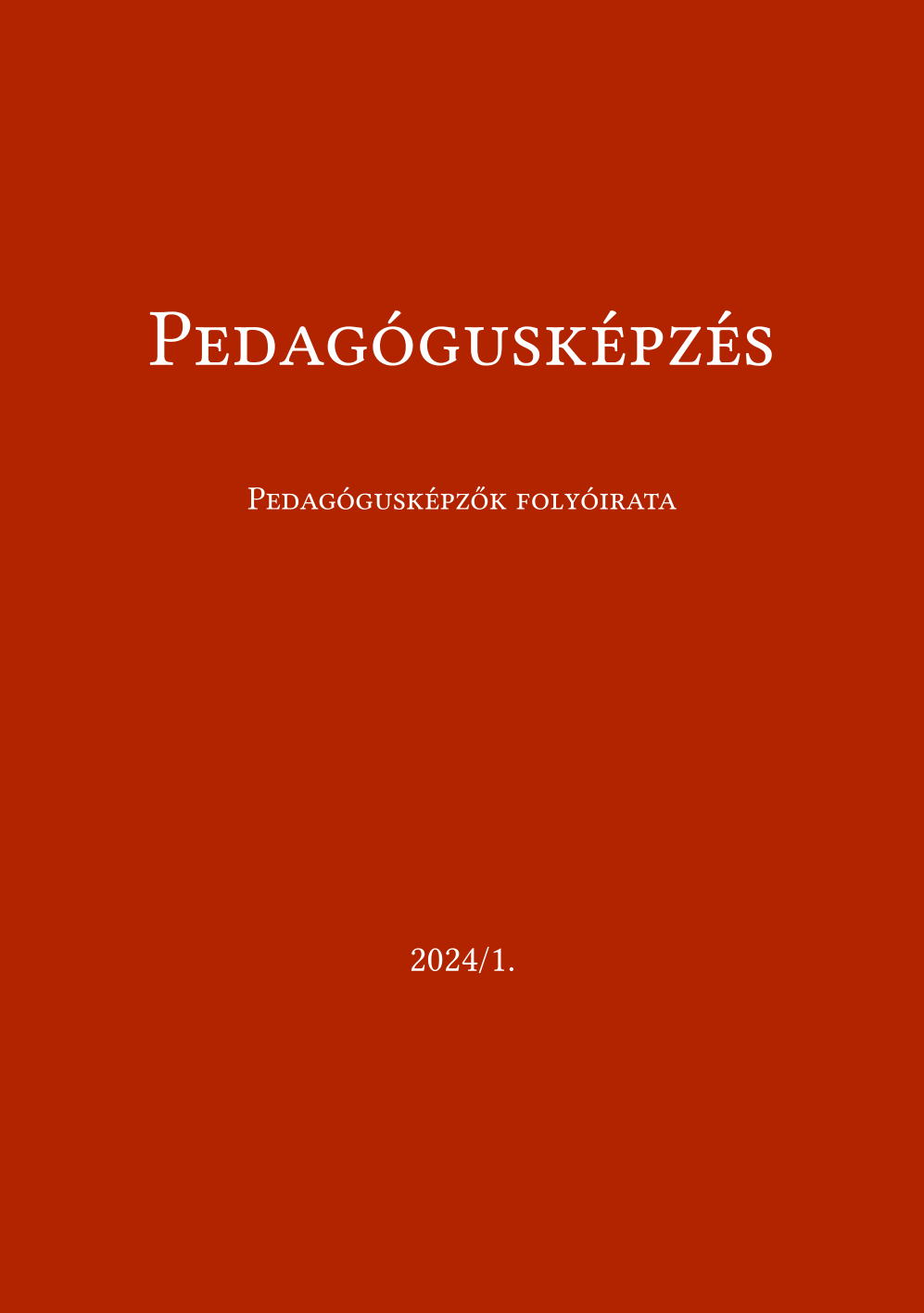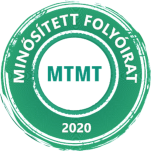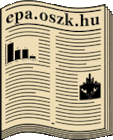Validating the Hungarian versions of MSLQ and MAI intended for use with Hungarian minority students in Slovakia
DOI:
https://doi.org/10.37205/TEL-hun.2024.1.03Keywords:
self-regulated learning, metacognition, cognition, motivation, learning strategy, self-efficacy, Hungarian minority education, pedagogue studentAbstract
Learning today provides students with several freedoms, including easy access to the content or learning materials and the flexibility to schedule their own time, in contrast to the traditional techniques of the past, where students had to spend time at school or in the classroom. The cognitive, metacognitive, and motivational skills that enable learners to overcome challenges and organize their learning depend on self-regulated learning.
The Motivation Strategies for Learning Questionnaire (MSLQ) is a tool to gauge students’ self-regulated learning (SRL) skills. Schraw and Dennison's Metacognition Awareness Inventory (MAI) was created to measure the metacognitive abilities of the learners.
This article aims to explore and assess the relevant literature on students' self-regulated learning and metacognition, SRL theories and concepts. Furthermore, it aims to determine the reliability and validity of these two with a sample of the pedagogy students at János Selye University. The study involved 120 pedagogy students, of which 102 were female. The MSLQ motivation scale in component A has six subscales and their Cronbach's Alphas are as follow: IGO’s α = 0.69, EGO’s α = 0.84, TV’s = 0.86, CLB’s α = 0.52, SE’s α = 0.86, and TA’s α = 0.74. In Component B, which includes nine subscales for learning strategies, R’s α is 0.69; E’s α is 0.75; O’s α is 0.85; CT’s α is 0.60; MSR’s α is 0.80; TSE’s α is 0.66; ER’s α is 0.80; PL’s α is 0.87; and HS’s is 0.57. As far as MAI goes, its two main components’ Knowledge of Cognition (KC) and Regulation of Cognition (RC), Cronbach's Alpha values, were examined. Three subscales make up the KC: PK, DK, and CK. The Cronbach Alpha of each was 0.82, 0.86, and 0.71, respectively. Five subscales make up the RC. The Cronbach Alphas of each is as follow: P’s α is equal to 0.83, IMS’s α is equal to 0.83, CM’s α is equal to 0.77, DS’s α is equal to 0.74, and E’s α is equal to 0.70.
References
Bandura, A. (1989). Social cognitive theory. In R. Vasta (Ed.), Annals of child development. Vol. 6. Six theories of child development (pp. 1–60). JAI Press.
Boekaerts, M. (1997). Self-regulated learning: A new concept embraced by researchers, policy makers, educators, teachers, and students. Learning and Instruction, 7, 161–186. https://doi.org/10.1016/S0959-4752(96)000 15-1
Boekaerts, M., Pintrich, P. R., & Zeidner, M. (Eds.) (2000). Handbook of self-regulation. Academic Press. https://doi.org/10.1016/B978-0-12-1098 90-2.X5027-6
Boekaerts, M., & Corno, L. (2005). Self-Regulation in the Classroom: A Perspective on Assessment and Intervention. Applied Psychology, 54(2), 199–231. https://doi.org/10.1111/j.1464-0597.2005.00205.x
Brown, A. (1987). Metacognition, executive control, self-regulation, and other more mysterious mechanisms. In F. E. Weinert & R. H. Kluwe, (Eds.), Metacognition, motivation, and understanding (pp. 65–116). Lawrence Erlbaum.
Jackson, C. R. (2018). Validating and Adapting the Motivated Strategies for Learning Questionnaire (MSLQ) for STEM Courses at an HBCU. AERA Open, 4(4). https://doi.org/10.1177/23 3285 84188093 46
Efklides, A. (2011). Interactions of metacognition with motivation and affect in selfregulated learning: The MASRL model. Educational Psychologist, 46(1), 6–25. https://doi.org/10.1080/004 6152 0.2011.538645
Efklides, A. (2019). Gifted students and self-regulated learning: The MASRL model and its implications for SRL. High Ability Studies, 30(1–2), 79–102. https://doi.org/10.1080/135 9813 9.2018.1556069
Ejubović, A. & Puška, A. (2019). Impact of self-regulated learning on academic performance and satisfaction of students in the online environment. Knowledge Management & E-Learning, 11(3), 345–363. https://doi.org/10.34105/j.kmel.2019.11.018
Pelikan, E. R., Luftenegger, M., Holzer, J., Korlat, S., Spiel, C., & Schober, B. (2021). Learning during COVID-19: the role of self-regulated learning, motivation, and procrastination for perceived competence. Zeitschrift fur Erziehungswissenschaft, 24(2), 393–418. https://doi.org/10.1007/s116 18-021-010 02-x
Flavell, J. H. (1971). First discussant's comments: What is memory development the development of? Human Development, 14(4), 272–278.
https://doi.org/10.1159/0002 7122 1
Flavell, J. H. (1979). Metacognition and cognitive monitoring: A new area of cognitive– developmental inquiry. American Psychologist, 34(10), 906–911. https://doi.org/10.1037/0003-066X.34.10.906
Flavell, J. H. (1987). Speculations about the Nature and Development of Metacognition. In F. E. Weinert, & R. Kluwe (Eds.), Metacognition, Motivation, and Understanding (pp. 21–29). Lawrence Erlbaum.
George, D., & Mallery, P. (2003). SPSS for Windows step by step: A simple guide and regerence. 11.0 update (4th ed.). Allyn and Bacon.
Hacker, D. J. (1998). Definitions and empirical foundations. In D. J. Hacker, J. Dunloky, & A. C. Graesser (Eds.), Metacognition in educational theory and practice (pp. 1–23). Lawrence Erlbaum.
Kallio, H., Virta, K. & Kallio, M. (2018). Modelling the Components of Metacognitive Awareness. International Journal of Educational Psychology, 7(2), 94–122. https://doi.org/10.17583/ijep.2018.2789
Honicke, T. & Broadbent, J. (2016). The Relation of Academic Self-Efficacy to University Student Academic Performance: A Systematic Review. Educational Research Review, 17, 63–84. http://dx.doi.org/10.1016/j.edurev.2015.11.002
Jacobs, J. E. & Paris, S. G. (1987). Children’s Metacognition About Reading: issues in Definition, Measurement, and Instruction. Educational Psychologist, 22(3–4), 255–278. https://doi.org/10.1080/004 6152 0.1987.9653052
Karlen, Y., Hertel, S. & Hirt, C. N. (2020). Teachers’ Professional Competences in Self-Regulated Learning: An Approach to Integrate Teachers’ Competences as Self-Regulated Learners and as Agents of Self-Regulated Learning in a Holistic Manner. Frontiers in Education, 5(159). https://doi.org/10.3389/feduc.2020.00159
Martos, T., Jagodics, B., Kőrossy, J. & Szabo, E. (2021). Psychological resources, dropout risk and academic performance in university students – pattern-oriented analysis and prospective study of Hungarian freshmen. Current Psychology, 42, 8051–8065. https://doi.org/10.1007/s121 44-021-020 73
Mercator-Education. (2005). Hungarian – The Hungarian Language in Education in Slovakia. Mercator-Education.
Panadero, E. (2017). A review of self-regulated learning: six models and four directions for research. Frontiers in Psychology, 8(422). https://doi.org/10.3389/fpsyg.2017.00422
Phavadee, S. (2020). Metacognition and the better learners’ performance in the learning. In 12th International Conference of J. Selye University. Sections of Pedagogy and Informatics. Conference Proceedings (pp. 203–210). J. Selye University. https://doi.org/10.36007/3778.2020.203
Pintrich, P. (2003). A Motivational Science Perspective on the Role of Student Motivation in Learning and Teaching Contexts. Journal of Educational Psychology, 667–686. https://doi.org/10.1037/0022-0663.95.4.667
Pintrich, P., Smith, D., Garcia, T., & McKeachie, W. (1991). A Manual for the Use of the Motivated Strategies for Learning Questionnaire (MSLQ). University of Michigan.
Pintrich, P. R., Smith, D. A. F., Garcia, T. & McKeachie, W. J. (1993). Reliability and Predictive Validity of the Motivated Strategies for Learning Questionnaire (Mslq). Educational and Psychological Measurement, 53(3), 801–813. https://doi.org/10.1177/00 1316 44930530 0302 4
Reder, L. M. (1996). Different Research Programs on Metacognition: Are the boundaries imaginary? Learning and Individual Differences, 8(4), 383–390. https://doi.org/10.1016/S1041-6080(96)900 24-2
Reder, L. M. & Schunn, C. D. (1996). Metacognition does not imply awareness: Stategy choice is governed by implicit learning and memory. In Reder, L. M. (Ed.) Implicit Memory and Metacognition (pp. 45–77). Erlbaum.
Roth A., Ogrin, S. & Schmitz, B. (2016). Assessing self-regulated learning in higher education: a systematic literature review of self-report instruments. Educational Assessment, Evaluation and Accountability, 28(3), 225–250. https://doi.org/10.1007/s110 92-015-9229-2
Schraw, G. & Dennison, R. S. (1994). Assessing Metacognitive Awareness. Contemporary Educational Psychology, 19, 460–475. https://doi.org/10.1006/ceps.1994.1033
Shi, J., Mo, X. & Sun, Z. (2012). Content validity index in scale development. Shi J., Mo X., Sun Z. Zhong Nan Da Xue Xue Bao Yi Xue Ban, 37(2), 152–155.
Taranto, D. & Buchanan, M. (2020). Sustaining Lifelong Learning: A Self-Regulated Learning (SRL) Approach. Discourse and Communication for Sustainable Education, 11(1) 5–15. https://doi.org/10.2478/dcse-2020-0002
Tobach, E., Aronson, L. R. & Shaw, E. (Eds.) (1971). Biopsychology of development. Academic Press.
Triquet, K., Peeters, J. & Lombaerts, K. (2017). Self-Regulated Learning Online: Empirical Foundations, Promotion & Evaluation for Teacher Professional Development. Contributing SRL Part to TeachUP. A policy experimentation co-funded by Erasmus+. Deliverable D1.1: Gaps in ITE and CPD provision report. Department of Educational Sciences, Vrije Universiteit Brussel.
Vamos, A. & Lenard S. (Eds.) (2014). Training Programme and Organisation in the bologna Process of Hungarian Higher Education: The BABE Project. Faculty of Education and Psychology of Eotvos Lorand University.
Wenden, A. (1998). Metacognitive Knowledge and Language Learning. Applied Linguistics, 19(4), 515–537. https://doi.org/10.1093/applin/19.4.515
Xiao, S., Yao, K. & Wang, T. (2019). The Relationships of Self-regulated Learning and Academic Achievement in University Students. SHS Web of Conferences, 60. https://doi.org/10.1051/shsconf/201 9600 1003
Zimmerman, B. & Schunk, D. (Eds.) (1989). Self-Regulated Learning and Academic Achievement: Theory, Research, and Practice. Springer Verlag. https://doi.org/10.1007/978-1-4612-3618-4
Downloads
Published
How to Cite
Issue
Section
License
Copyright (c) 2024 The author(s)

This work is licensed under a Creative Commons Attribution-NonCommercial-NoDerivatives 4.0 International License.








